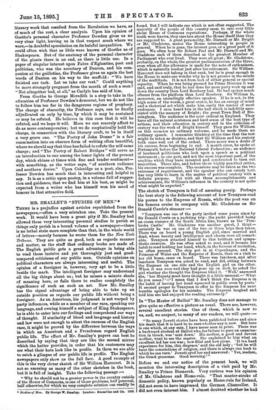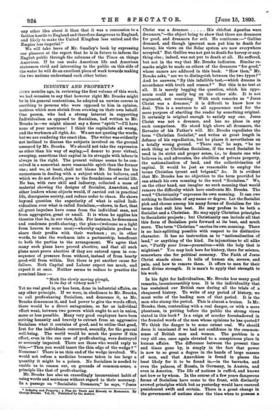MR. SMALLEY'S "STUDIES OF MEN."*
THERE is a prejudice against articles republished from the newspapers,—often a very mistaken one. Take the present work. It would have been a great pity if Mr. Smalley had allowed these very interesting personal studies to perish as things only perish in a bound volume of a newspaper—there is no lethal state more complete than that, in the whole world of letters—merely because he wrote them for the New York Tribune. They are quite as good, both as regards manner and matter, as the stuff that ordinary books are made of. The English public gets a great advantage in being able to read these incisive and yet thoroughly just and good- tempered criticisms of our public men. Outside opinions on political characters are always interesting and useful. The opinion of a foreigner is, however, very apt to be a little beside the mark. The intelligent foreigner may understand all the big things about us ; but he misses a minute shade of meaning here, or fails there to realise completely the significance of such an such an act. Now Mr. Smalley has the signal advantage of being able to take up an outside position as regards our public life without being a foreigner. As an American, his judgment is not warped by party influences, while as a member of our race, speaking our language, and owning himself a subject of King Shakespeare, he is able to enter into our feelings and comprehend our ways of thought. If similarity of blood and language and history and law were not enough to attest the oneness of the English race, it might be proved by the difference between the ways in which an American and a Frenchman regard English public life. The effect of Mr. Smalley's papers can best be described by saying that they are like the second mirror which the hatter provides, in order that his customers may Bee what their hats look like in profile. In them we are able to catch a glimpse of our public life in profile. The English newspapers only show us the fall face. A good example of this is the very clever sketch of Sir William Harcourt. It is not so amusing as many of the other sketches in the book, but it is full of insight. Take the following passage :— " Why he should not be a greater power in the country outside of the House of Commons, is one of those problems, half personal, half otherwise, for which no very complete solution can readily be • Studies of Men. By George W. Smalley. London : Macmillan and Co. 1895. found. But I will indicate one which is not often suggested. The majority of the people of this country seem to care very little about House of Commons reputations. Perhaps, if the whole truth were known, they care less about the House itself than they are supposed to. A great personality, Mr. Disraeli or Mr. Bright or Mr. Gladstone, makes the House interesting to people in general. When he is gone, the interest goes, or a great part of it goes. We often hear Sir Robert Peel and Mr. Disraeli and Mr. Gladstone each of them described as the greatest Member of Parliament who ever lived. They were all great; Mr. Gladstone,. probably, on the whole, the greatest parliamentarian of the three, even when all due allowance is made for the note of enthusiasm, which is naturally loudest just after his retirement. Sir William Harcourt does not belong in that rank, but he is great enough in the House to make one wonder why he is not greater in the minds of the multitude. It is not from lack of either general or special capacity. When he was being pressed for Prime Minister it was said, and said truly, that he had done far more party work up and down the country than Lord Rosebery had. He had spoken much oftener from the platform than Lord Rosebery. Sir William is, moreover, an exceedingly effective speaker. If he is not, in the high sense of the words, a great orator, he has an energy of mind and a rhetorical art which make him easily the master of most audiences. I once heard him in the hall which is indelibly asso- ciated with the memory of Bright; the great Town Hall of Bir- mingham. The audience is the most critical in England. They have all the natural acuteness and hard sense of the best type of artisan, and their education in oratory and in the criticism of oratory was the work of Bright himself. They gave Sir William on this occasion no ordinary welcome, and he made them no ordinary speech. I remember thinking at the time that the test might be taken as decisive, and that Sir William and his oratory both came well out of the ordeal. There never was a doubt of his success, from beginning to end. A month since, he spoke at Portsmouth before the National Liberal Federation ; an audience- of hardened politicians who look upon a speech as a political instrument ; as one part, and not the most important part, of the machine which they have invented and constructed to turn out majorities. There also, and before these highly practical critics,. his success was complete. The occasions may be taken as the two extremes of requirement, and the speaker who can satisfy both has very little to learn in the matter of political oratory with a definite purpose. Yet with all these accomplishments and achievements, Sir William's influence in the country is not quite what might be expected."
The sketch of Tennyson is full of amusing gossip. Perhaps the best story is the following account of how Tennyson read his poems to the Empress of Russia, while the poet was on his famous cruise in company with Mr. Gladstone on Sir Donald Currie's steamer :—
"Tennyson was one of the party invited some years since by Sir Donald Currie on a yachting trip : the yacht provided being an ocean steamer of the South Africa line, known as the Pem- broke Cantle.' Mr. Gladstone was another guest, I think— certainly he was on one of the two or three trips then taken. There was on board a young English girl, since married and dead, whose beauty and intelligence and charm were all remark- able. Tennyson attached himself to this brilliant and sympa- thetic creature. He was often asked to read, and it became his habit to read holding her hand, which, in the fervour of recitation, he often pressed. The ship put in at Copenhagen, and the Princess of Wales and the Empress of Russia, then on a visit to her old home, came on board. There was luncheon, and after luncheon Tennyson was asked to read, and did, sitting between the Empress on one side and the English girl on the other. When it was over and they had gone up on deck, he asked the girl whether she thought the Empress liked it. Well,' answered she, her Majesty must have thought it a little unusual.—' What do you mean ? '—'I mean that I don't think the Empress is in the habit of having her hand squeezed in public even by poets.' It seemed proper to Tennyson to offer to the Empress his most humble apologies for his mistake. The Empress laughed and. told him she had enjoyed the reading extremely."
In "The Master of Balliol" Mr. Smalley does not manage to give quite so effective a picture as usual. There are, however, several excellent stories. One of them, which is new to us, and, we suspect, to many of our readers, we will quote :-
" So many Jewett stories have been published before and since his death that it is hard to be sure whether any is new. Bat here is one which, at any rate, I have never seen in print. There was a backward student at Balliol who, for failure to pass an examina- tion in Greek, was sent down.' His mother, a good and devout mother, went to see the master. She explained to him what an excellent lad her son was ; how filial and how pions. 'It is a hard experience for him, this disgrace,' said the old lady ; cut be will have the consolations of religion, and there is always one book to which he can turn.' Jowett eyed her and answered : Yes, madam, the Greek grammar. Good morning.'" Before we end our notice of the present book, we will mention the interesting description of a visit paid by Mr. Smalley to Prince Bismarck. Very curious was his opinion of Mr. Gladstone and Home-rule. "That master-stroke of domestic policy, known popularly as Home-rule for Ireland, dictnot seem to have impressed the German__Chancellor. It did not even interest him. I almost doubted whether he had
any other idea about it than that it was a concession to a faction hostile to England and therefore dangerous to England, and likely to make the United Kingdom less united and the Empire less imperial."
We will take leave of Mr. Smalley's book by expressing our pleasure at the report that he is in future to inform the English public through the columns of the Times on things American. If he can make American life and American statesmen vivid and interesting to the public on this side of the water he will do an excellent piece of work towards making the two nations understand each other better.



































 Previous page
Previous page